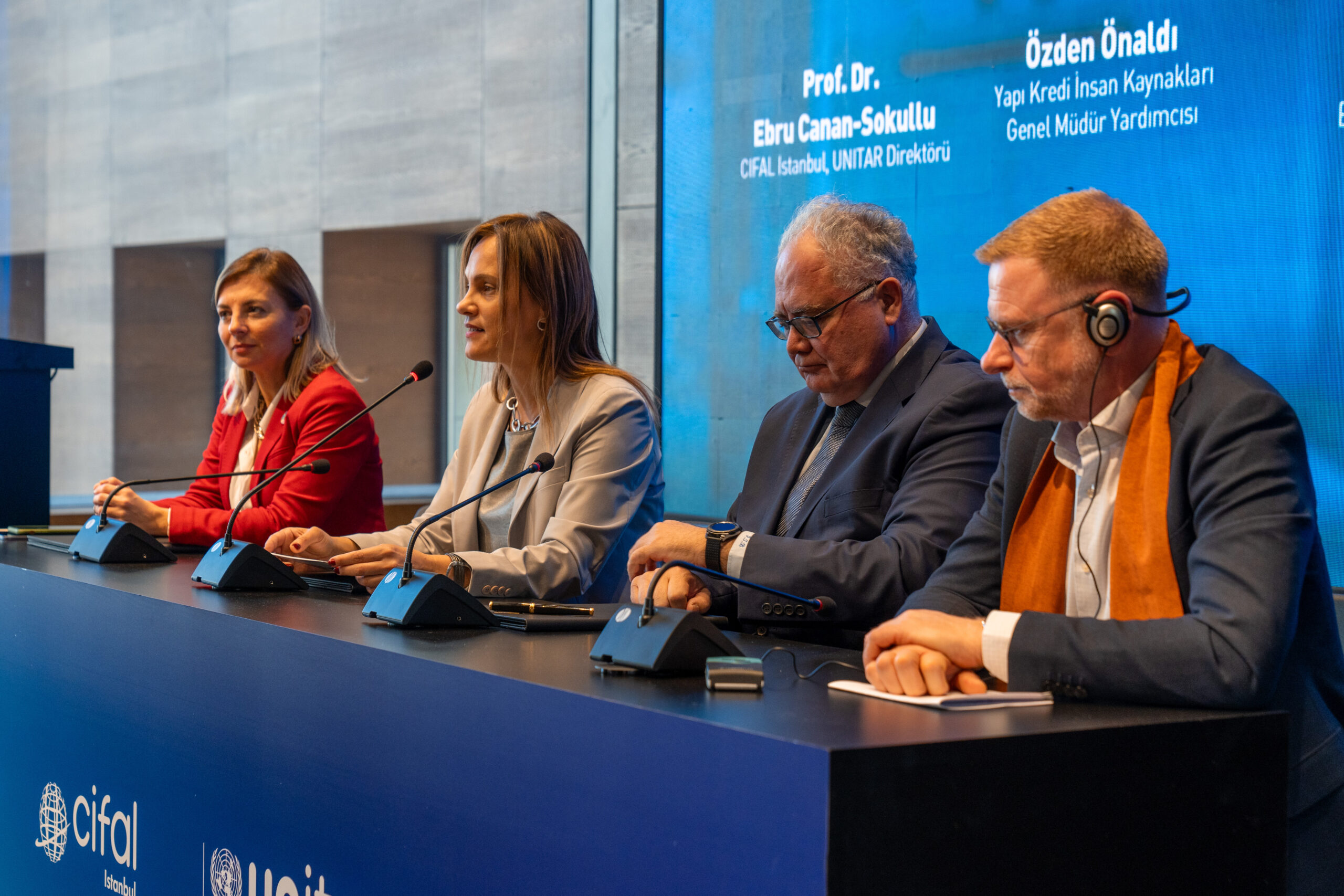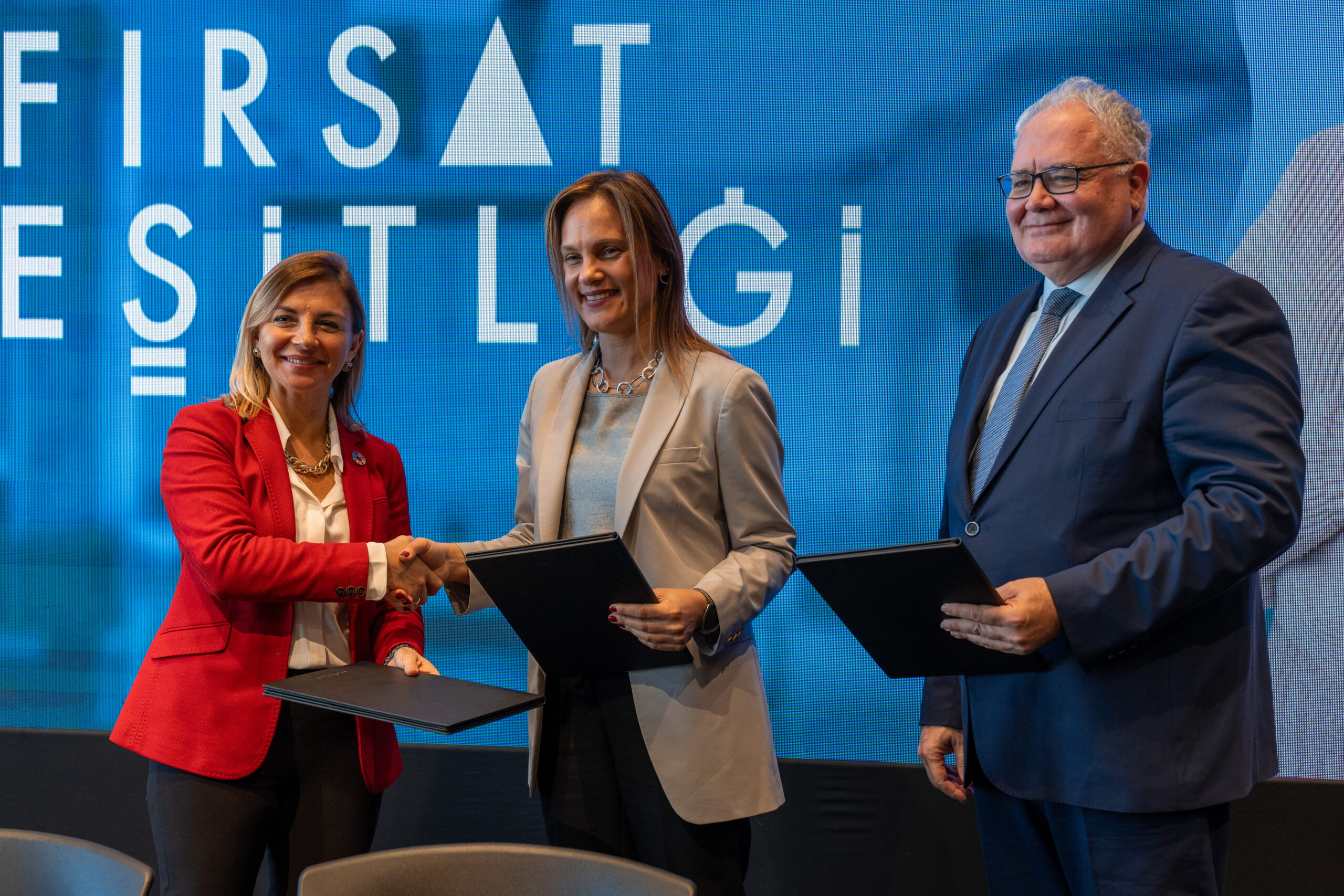“Equal Opportunity in Technology” project was launch in partnership with Yapı Kredi, CIFAL Istanbul, United Nations Institute for Training and Research (UNITAR), and Bahçeşehir University (BAU) on November 21, 2023.
As part of the project, comprehensive training content has been prepared by experts in the field, covering topics from big data to artificial intelligence, cloud technologies to cybersecurity, and the Internet of Things to Industry 5.0. The project aims to reach 80,000 women in three years and increase their knowledge and awareness in the field of technology through the training provided by Yapı Kredi Academy and Bahçeşehir University. Participants who score 70 percent or higher in the final exam after completing the training will be eligible to receive the “Equal Opportunity in Technology” certificate, signed by Yapı Kredi, UNITAR, and BAU, and approved by e-Government. Participants with 75 percent attendance in the training will also be able to receive a UNITAR-accredited achievement certificate. The training, which will be offered free of charge to all women between the ages of 18-27 across Türkiye, will also be available to young people living in the Hope Cities established by Koç Holding, and in the earthquake-affected zones, regardless of gender.
Aiming for equal opportunities in technology
Özden Önaldı, Executive Vice President of Yapı Kredi, stated that Yapı Kredi is an institution that not only advocates gender equality, but also implements it, and made the following assessment: “We believe that the presence of women in every field of business is an indicator of civilization for countries. With this perspective, as a long-time industry leader in gender equality and women’s employment, we have carried out many pioneering projects to date. As an uncompromising advocate of gender equality, we are working hard to ensure equal opportunities for women in the field of technology and innovation. In line with the global leadership initiated by our main shareholder, Koç Holding, at the United Nations Women Generation Equality Forum, we, as Yapı Kredi, have committed to ensuring equal opportunities for women and girls in technology and innovation for the next three years. In this regard, we aim to reach 80,000 women in three years with the training we will provide through the ‘Equal Opportunity in Technology’ project, which we launched in partnership with the International Training Center for Authorities and Leaders (CIFAL Istanbul) affiliated with the United Nations Institute for Training and Research (UNITAR), and Bahçeşehir University (BAU). We know that gender equality is the key to a more just and sustainable world. We will continue to take responsibility for a world where women are the architects of global prosperity and happiness, with our uncompromising commitment to gender equality.“
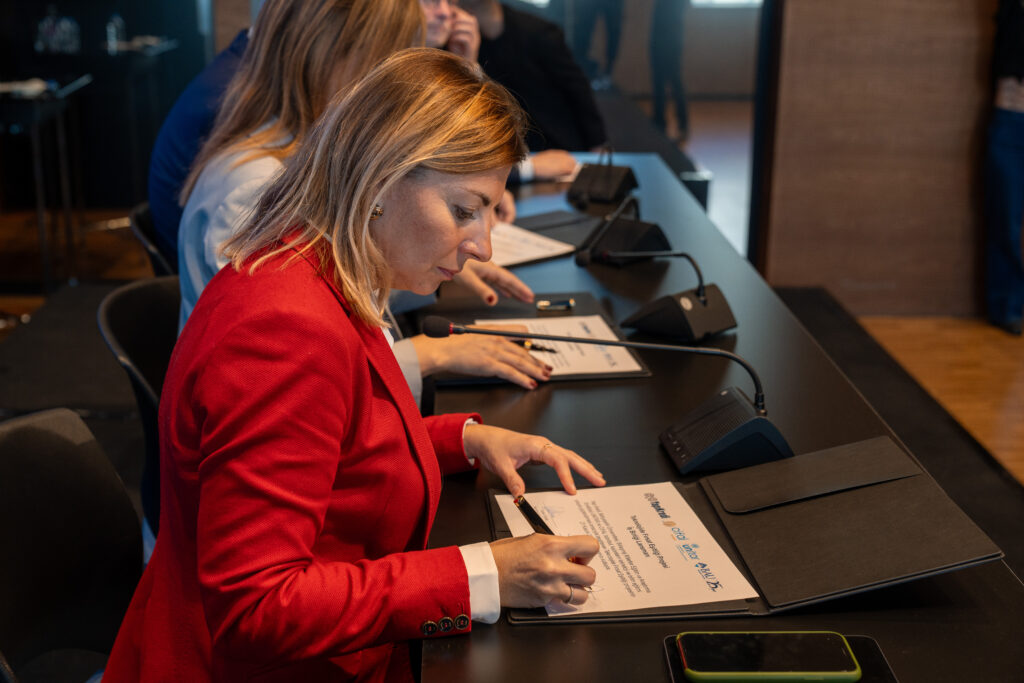
Prof. Dr. Ebru Canan-Sokullu, Director of CIFAL Istanbul, the United Nations Institute for Training and Research (UNITAR) International Training Center for Authorities and Leaders, expressed the key points of the “Equal Opportunity in Technology” project: “Social responsibility projects shape not only individuals and communities but also our future. In the context of gender equality, we aim to contribute to the transformation of not only individuals but also the business world by reaching thousands of young women through the ‘Equal Opportunity in Technology’ project. With the realization of this project, we are taking an important step toward building a more just and sustainable future together. As we implement this project, we must be aware that we have a responsibility not only today but also as the leaders of tomorrow. We look forward to celebrating this great achievement and taking the first steps of our project together.”

Prof. Dr. Tunç Bozburda, Vice Rector of Bahçeşehir University, the other partner of the project,shared the goals of the “Equal Opportunity in Technology” project: “‘Equal Opportunity in Technology’, a valuable collaboration we carry out with Yapı Kredi, is an initiative to empower women through technology and science education. With this project, we aim to increase women’s employment and gender equality in the industry, strengthen the potential talents of young women, and develop female industry leaders.“
Applications for the project, which is led by Yapı Kredi in partnership with the International Training Center for Authorities and Leaders (CIFAL Istanbul) affiliated with the United Nations Institute for Training and Research (UNITAR), and Bahçeşehir University (BAU), can be submitted through here.

CIFAL Istanbul team attended the Radboud Conference on Earth System Governance organized by Radboud University and Earth System Governance Project in Nijmegen, Netherlands.
The Radboud Conference on Earth System Governance, held from October 22 to 27, recently concluded, leaving a profound impact on over 600 national and international researchers, policymakers, and societal stakeholders who convened to discuss the urgent need for societal changes to address sustainability challenges.
The conference, spanning six intensive days and featuring 150 sessions, served as a dynamic forum for exploring innovative approaches to confront pressing global sustainability issues. Participants engaged in a rich dialogue that included discussions on fundamental changes required in human relationships with nature and animals, as well as in economic, political, and legal systems.
Organized by the conference’s institutional co-host Dahdaleh Institute for Global Health Research, York University, “Integrating Planetary Health within Earth System Governance Semi-Plenary Session” drew significant attention. The session featured director Prof. Ebru Canan-Sokullu, Director for CIFAL Istanbul UNITAR, whose keynote address emphasized the critical importance of intertwining planetary health and governance. Discussions focused on how global environmental governance can effectively address health concerns while ensuring a sustainable future for our planet.
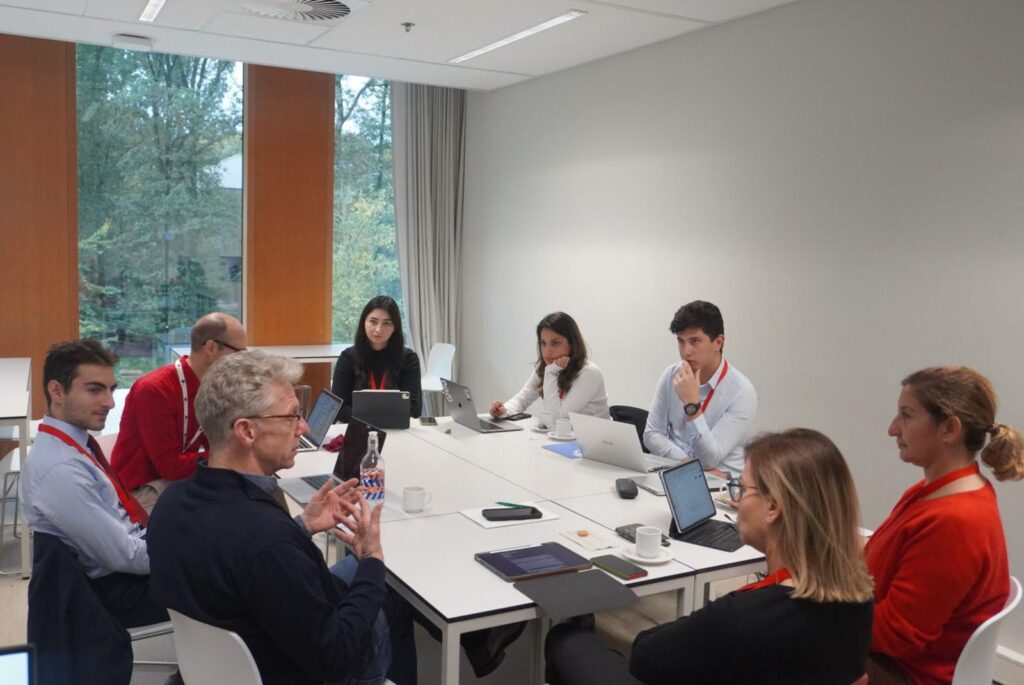
CIFAL Istanbul team, including Pamir Canan, Aslı Çalım, Dize Doğan, and Ozan Savran, also organized “The ties that bind: World Café on youth engagement as a driving force for community-based healing in times of environmental and social shocks Innovative Session“. The session provided a special focus on the community-based healing following the massive earthquake that struck Türkiye and Syria in February 2023 and youth involvement. The team had successfully executed the World Cafè on youth engagement as a driving force for community-based healing in times of environmental and social shocks, developed following the massive earthquake that struck Türkiye and Syria in February 2023. The session followed an informal discussion on the governance in times of crisis and youth participation in the healing process.
The Radboud Conference serves as an essential stepping stone in advancing global environmental governance. It brings together visionaries and experts from various backgrounds, uniting them in a shared goal of addressing the world’s most pressing sustainability challenges. The conference’s commitment to fostering innovative thinking and global collaboration highlights the crucial role it plays in paving the way for a more sustainable and equitable world.
CIFAL Istanbul, in collaboration with TOSAM and the Faculty of Law, organized “SDGs and Beyond 2: Challenges and Opportunities for the SDGs after 2030 Roundtable” on 9 November 2023 with the participation of Alex Meija, Director of the United Nations Institute for Training and Research.
Mr. Alex Meija shared his experiences from his career journey to the United Nations. The roundtable focused on improving work and cooperation for the SDGs, what can be done to achieve the 2030 Agenda and how far the SDGs have progressed since 2015.
Efforts were made to ascertain the advancement status of individual Sustainable Development Goals (SDGs), identifying those that have made notable progress and those facing critical challenges, while seeking actionable strategies to expedite their advancement. In the highly interactive and productive meeting, the question of how the process of setting new sustainable development goals can proceed after the development / achievement of the goals set by 2030 was discussed. It was emphasized to what extent the rapidly developing technology, which has come a long way even since 2015 when the Sustainable Development Goals were set, can contribute to the process after 2030.
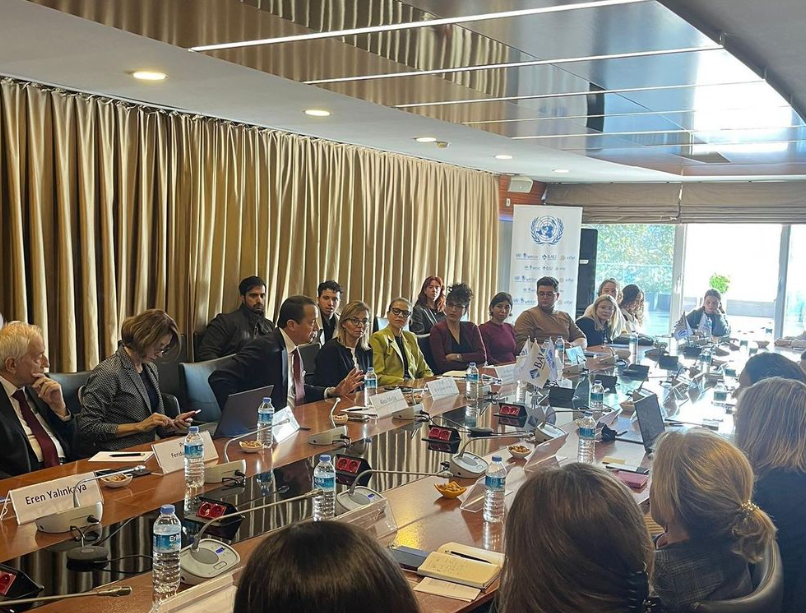
Food production generates a lot of residual material, which is usually not put to use but disposed of. At the same time, there is an increasing demand for alternatives to plastic packaging. Biodegradable and compostable packaging can be a sustainable solution, especially if it is made of leftovers from food production. In a new SAVE FOOD research project, students of Bahçeşehir University (BAU) in Istanbul have developed interesting ideas regarding the matter.
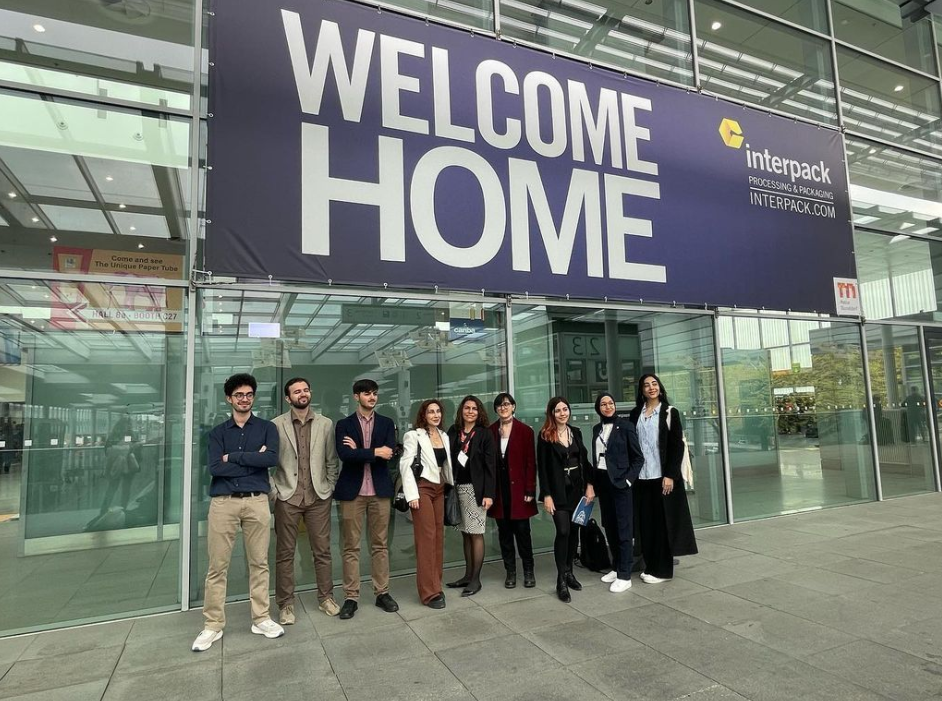
“Bio-Based Packaging Using Food Waste Student Challenge (Student Competition for the Development of Bio-Packaging Using Food Waste/Byproducts)” started in October 2022 with the proposal of FAO Regional Office for Europe and Central Asia in partnership with Bahçeşehir University, Messe Düsseldorf GmbH and CIFAL Istanbul – UNITAR.
For this interdisciplinary research project, 28 students from different courses of study – bio-engineering and bio-medical engineering, industrial design, industrial engineering and management, computer engineering, molecular biology and genetics, electrical engineering/electronics and energy systems technology – have assembled in six teams. As preparation, they enrolled in courses on topics like food packaging, materials science, design thinking and applied nanotechnology. The project took off in the middle of December 2022, and the teams were given three months to complete their projects.The groups presented the results and the uniqueness of their work to the esteemed jury members who determined the two groups to represent BAU and CIFAL Istanbul at the Interpack Trade Fair in Düsseldorf in May 2023.
Six project ideas developed by students were as follows:
- SCOBY biofilm using tea waste as a novel packaging for dried foods (winner)
- PLA and rice husk integrated nano-film for the modified atmosphere packaging of strawberries (winner)
- 3D printed pectin film for confectionery
- Double-layered packaging made from banana leaves, mussel shells, and watermelon rinds
- Nano-film using pomegranate peel for meat packaging
- Beeswax-coated inner case for milk packaging
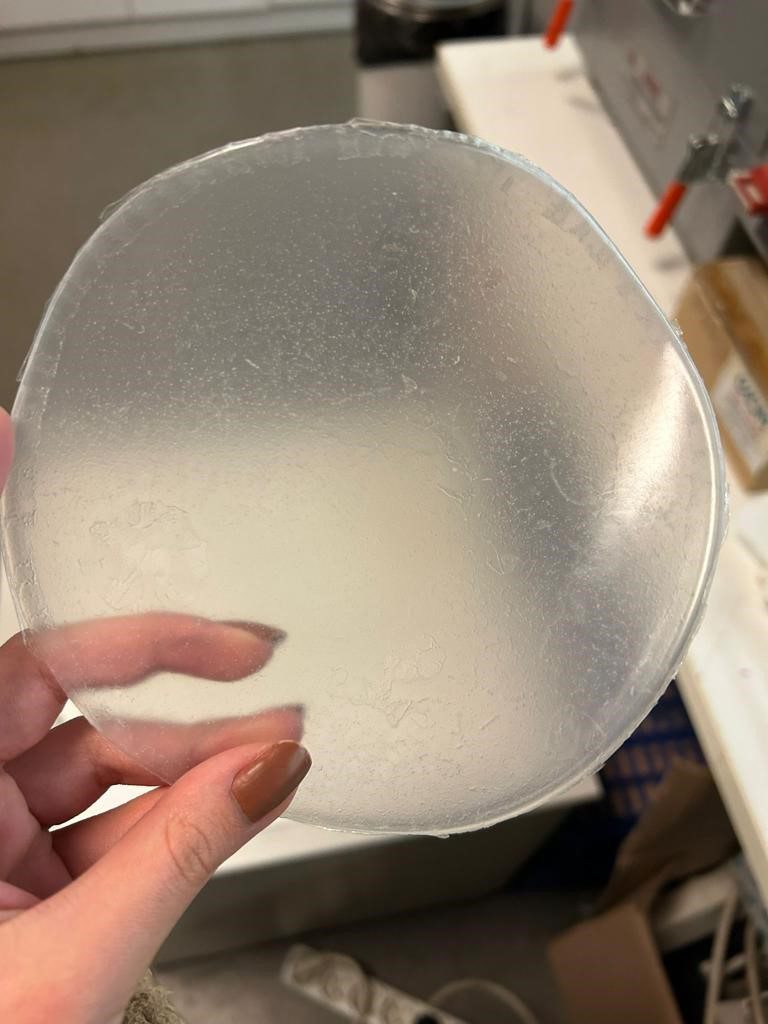
For example, for packaging dry foods, a bioplastic wrap made of kombucha SCOBY was developed, made from waste material of oranges and tea leaves. Another team implemented the idea of packaging strawberries under a protective atmosphere using integrated nano wrap made from PLA and rice husks. For sweets, one team developed a 3D printed pectin film, another produced double-layer food packaging from banana leaves, seashells and watermelon rinds. Packaging for meat, made from nano wrap and pomegranate peel, as well as a beeswax-coated inner sleeve for milk cartons, were also among the student teams’ ideas.
Two projects made it into the final selection of the jury: the SCOBY bioplastic wrap made of waste tea leaves and oranges and the protective packaging for strawberries made from PLA and rice husks. “All the concepts that were entered for the challenge have the potential – after some improvements – for practical use”, says Zeynep Tacer Caba, Assistant Professor at the faculty for engineering and natural sciences at Bahçeşehir University, who is responsible for the project. “The two chosen projects have especially good prospects with regard to practical applicability.” They have the potential to become truly sustainable, environmentally friendly solutions for the current problems in the food packaging sector. However, the groups who did not win are planning to continue their ideas as research projects.”

Both selected projects were presented at interpack within the forum Spotlight Talks & Trends in May 9, 2023. “The six groups of students have worked really hard to master numerous challenges, for example the selection and safety of food sources, the feasibility of their ideas, internal communication problems within the group or technical challenges regarding the experiments”, says Zeynep Tacer Caba. “All in all, they have learned how to develop a product all the way from the initial idea to the prototype.”
The kick-off for this innovative project was the regional conference “Enabling the change” hosted by the FAO in Istanbul in October 2022, which was dedicated to the framework conditions and innovations surrounding the reduction of food waste. The project partners are the SAVE FOOD Initiative, Messe Düsseldorf GmbH and CIFAL Istanbul, which is part of the United Nations Institute for Training and Research UNITAR, and Bahçeşehir University.

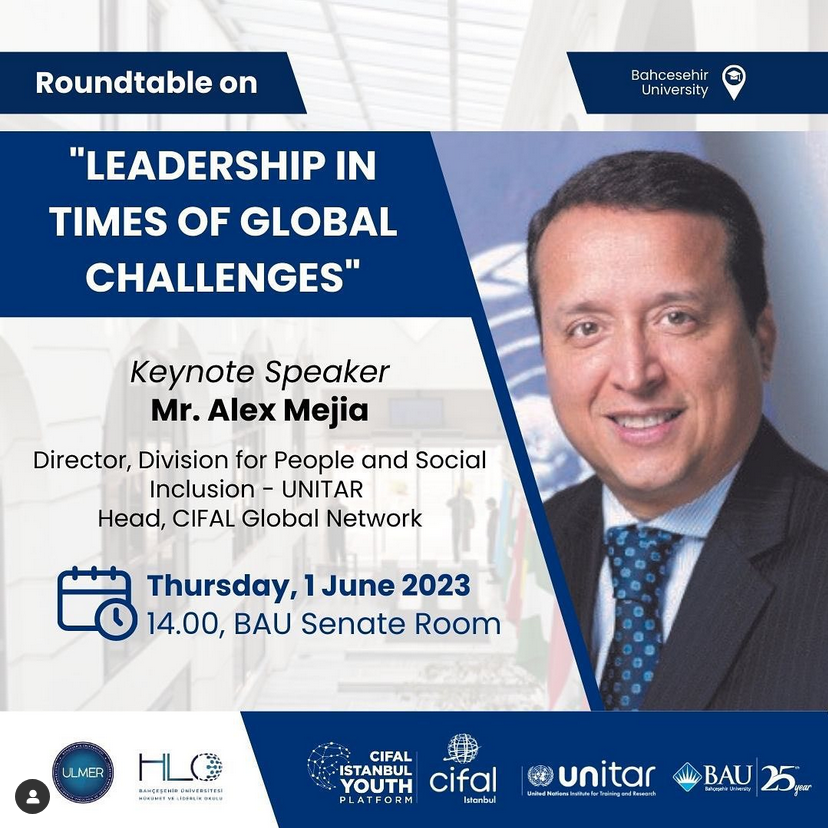
CIFAL Istanbul, CIFAL Istanbul Youth Platform and School of Government and Leadership will host Mr. Alex Mejia, Director of the Division for People and Social Inclusion at UNITAR and Head of CIFAL Global Network, at tomorrow’s roundtable meeting on “Leadership in Times of Global Challenges”.

